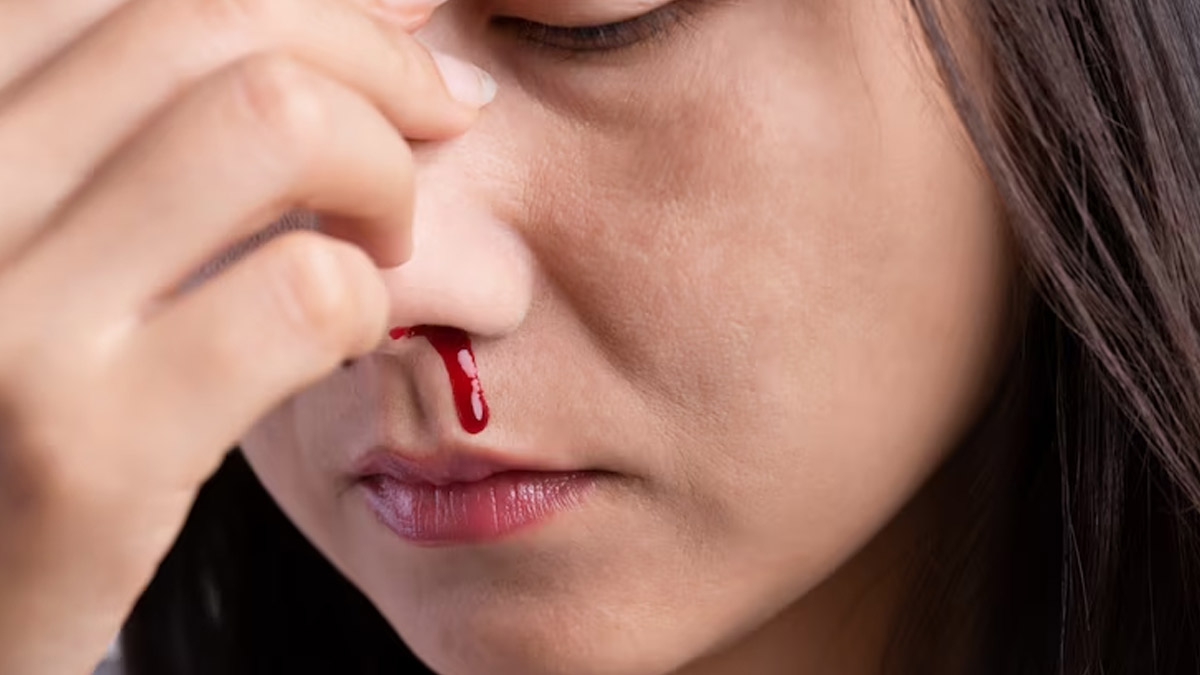
You may have encountered a nosebleed once or more or have seen someone experiencing it. While it is a minor issue, frequent and heavy nosebleeds can be a cause for concern. One common observation is that nosebleeds tend to increase during the summer months. This article explores why nosebleeding occurs and why it increases in summer.
Table of Content:-
What Causes Nosebleeds?
There are various reasons why nosebleeds can happen, and it is important to determine the underlying cause to manage it effectively. Some common causes of nosebleeds include the following.
Dry Air: The inner lining of your nose can be irritated by dry air, leading to dryness and cracking, making it more susceptible to nosebleeds.
Trauma: Any injury to the nose due to nose picking, blowing it too hard, or a direct hit to the nose, can cause a nosebleed. In some cases, the trauma can also cause a blood vessel in the nose to rupture, leading to nosebleeds.

Also Read: From Workout Injuries To Bleeding Gums: 5 Bodily Signs You Need A Multivitamin
Allergies: Allergies can also lead to inflammation of the nasal lining, making it more prone to nosebleeds.
Infections: You can also suffer from nose bleeding due to infections like sinusitis or the common cold. This is because these infections irritate and inflame the nasal lining, causing bleeding.
Medical Conditions: Certain medical conditions, such as high blood pressure, blood clotting disorders, and tumours, can also lead to nosebleeds.
Why do Nosebleeds Increase During Summer?
While nosebleeds can happen any time of the year, many people tend to experience them more frequently during the summer months. Here are some reasons why.
Hot Weather: The hot weather during summer can lead to dehydration, which in turn can cause dryness in the nasal lining, making it more prone to nosebleeds.
Humidity: While dry air can lead to nosebleeds, high humidity levels during summer can also contribute to nosebleeds. High humidity levels can cause the nasal lining to swell, making it more susceptible to injury and nosebleeds.

Outdoor Activities: Summer is a time for outdoor activities, and sports such as basketball, football, and soccer can increase the risk of nosebleeds due to falls and other physical injuries.
Swimming: Swimming is a popular summer activity, but the chemicals in the pool water can irritate the nasal lining, leading to nosebleeds.
Allergies: Summer is also a time for seasonal allergies, and the use of nasal decongestants or antihistamines can contribute to nosebleeds.
Also Read: Eye Bleeding: Types, Causes, Symptoms & Treatment
How to Prevent Nosebleeds
Here are some easy steps you can follow to prevent nosebleeds.
Keep the Nasal Lining Moist: Using a humidifier or saline nasal spray can help keep the nasal lining moist, reducing the risk of nosebleeds.

Avoid Irritants: Avoiding irritants such as cigarette smoke, air pollution, and chemical fumes can reduce the risk of nosebleeds.
Avoid Picking the Nose: Picking the nose can cause injury to the nasal lining, leading to nosebleeds. Thus, if you avoid nose picking, you reduce the chances of nose bleeding induced by it.
Bottomline
If you experience frequent or heavy nosebleeds, visiting a doctor to know its underlying causes, proper care, and treatment is important.
Image Credits: freepik
Also watch this video
Read Next
8 Tips To Reduce Nausea Symptoms
How we keep this article up to date:
We work with experts and keep a close eye on the latest in health and wellness. Whenever there is a new research or helpful information, we update our articles with accurate and useful advice.
Current Version
